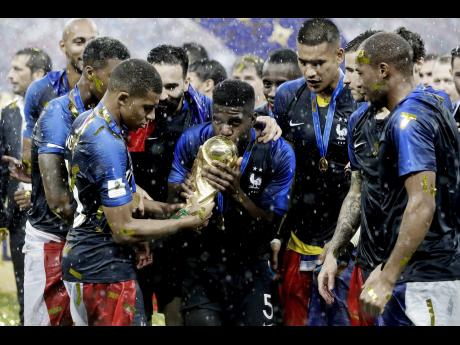Dalton Myers | World Cup takeaway
There's something about World Cup football that grabs your attention, whether you are a seasoned sports fan or know little about the sport or players. Now that Russia 2018 has ended and France have won their second title, the post-mortem has begun with numerous talking points.
There was debate before this event surrounding Russia's bid and the FIFA scandal, as well as reduced publicity this side of the world due to USA's non-qualification. Some even argued that without Italy and the Netherlands, this World Cup would struggle to live up to previous editions. How wrong were they!
I want to look at five takeaways from the FIFA World Cup 2018.
Sport creates a level playing field
Coming into the tournament, Russia was ranked 70th - the worst-ranked team in the competition - but managed to beat 10th-ranked Spain and advance to the round of 16, only losing to Croatia, a nation with a population of approximately 4.1 million. Iceland, ranked 22nd with a population of 337,780, drew with world 5th-Argentina (with a population of approximately 44.7 million). Many highly ranked teams, including 2014 champions Germany, struggled, while less-fancied teams had a good tournament. So while there's a huge disparity among countries in terms of population and stages of economic and football development, on the field, it's still the same number of players, and discipline on the field of play is what determines who goes through.
Broadcast
Broadcast rights are crucial for media houses as rights holders use various activations to ensure there's return on investment. The landscape has changed significantly since the last World Cup. In Jamaica, fans could watch the tournament via Television Jamaica and SportsMax Limited. It gave the public options and access on the go as both offered viewing using mobile applications.
National pride
Passion was evident as fans donned colours and symbols supporting their countries of birth or naturalisation, or in the case of Jamaicans, the country we adopted (in most cases Brazil). If we remember our own qualification in 1998, the euphoria led to a holiday! Now, you can imagine the range of emotions felt by those watching their countrymen score or the sorrow of defeat at a critical stage. The World Cup can fuel the passion of nationalism among fans as they support their fellow men.
Education
The tournament also fulfils an educational purpose. We learn the background stories of players, countries and, officials officials and the history of the geopolitical issues surrounding these persons and their countries. These stories connect with us and give us that 'aha' moment.
If you didn't know much about football prior to the tournament, you should now be more aware. The introduction of the video assistant referees (VAR) led to decisions being explained by commentators with precision and rules referenced to support or cast shadow over a decision. There was much discussion about VAR, goals line technology - or reasons the game had paused. From the wit of British commentator Peter Drury to the calmness of local presenters like Lance Whittaker or Neville Bell, we got most of the information needed.
The rest, we hastily searched online to have our post-match arguments/discussions.
Commercialisation of sport
The World Cup is about commercialisation. Simple. Everything else is a subset of that, and Russia 2018 was no different. Nationalistic sentiment expressed by players is great and gives a sense of pride and joy. Every athlete wants to go to the World Cup and do well for his country, but importantly, it also increases his brand. His value goes up while bonuses can be gained from respective countries and endorsement contracts.
The sale of broadcast rights and merchandise both in the host country or worldwide and the many advertisements and commercial activities by FIFA partners are all well-orchestrated to generate as much income as possible. The broadcast angles and the advertisement placement around the field of play, in stands, in and around the stadium, or the corner of your TV coverage are carefully selected. From players' shoes to the waistcoat worn by a manager - these are not just random occurrences.
I enjoyed the World Cup, and as William Shakespeare declares, "All the world's a stage, and all the men and women merely players."
- Dalton Myers is a sports consultant and administrator. Email feedback to daltonsmyers@gmail.com

